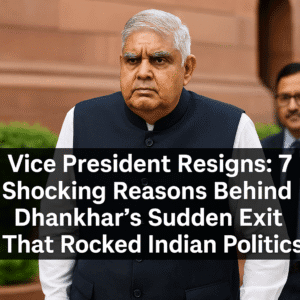Vice President Resigns: 7 Shocking Reasons Behind Dhankhar’s Sudden Exit That Rocked Indian Politics
India’s Vice President Jagdeep Dhankhar abruptly resigned midway through his term, ostensibly due to health reasons. The suddenness shocked observers, coming just hours after confirming a public event and days after humorously referencing his 2027 retirement. His resignation followed an unscheduled meeting with President Murmu and landed on the volatile first day of Parliament’s Monsoon Session. Earlier that day, Dhankhar had accepted opposition motions targeting two High Court judges, causing significant embarrassment to the ruling BJP, which was trying to manage the process.
This judicial intervention, coupled with Dhankhar’s history of independent remarks criticizing both the government and judiciary, fueled widespread speculation about the true catalyst for his exit. While officially stepping down for medical care, the timing and preceding political friction leave lingering questions. His departure creates an immediate vacuum in presiding over the Rajya Sabha during a critical session.

The Official Reason vs. The Sudden Context:
In his resignation letter invoking Article 67(a) of the Constitution, the 74-year-old Dhankhar stated the need to “prioritise health care and abide by medical advice.” While he underwent a medical procedure earlier this year, his subsequent return to a full schedule of presiding over the Rajya Sabha and attending events nationwide made the timing deeply surprising. Just days prior, speaking at Jawaharlal Nehru University, he had quipped, “I will retire at the right time, August 2027, subject to divine intervention.”
Adding to the intrigue, sources confirmed an “unscheduled” meeting between Dhankhar and President Murmu at Rashtrapati Bhavan shortly before the resignation was announced. No details of their discussion were released.
A Session Begins Amidst Political Tension:
Dhankhar’s resignation caps a politically charged first day of the Monsoon Session, where he presided over the Rajya Sabha as its Chairman. His actions in the House that very day are now under intense scrutiny:
- Judicial Removal Motions: Dhankhar formally acknowledged receiving a notice from over 50 Opposition MPs seeking the removal of Allahabad High Court Judge Justice Shekhar Yadav over alleged objectionable remarks. He stated an inquiry was ongoing regarding a signature irregularity on the notice.
- The Justice Varma Flashpoint: More significantly, Dhankhar announced the acceptance of another notice (also signed by over 50 MPs) seeking the removal of Justice Yashwant Varma, who faces an inquiry over alleged currency recovery. Crucially, Dhankhar stated that as identical notices were submitted in both Houses the same day, a joint inquiry committee would be formed per the Judges (Inquiry) Act, involving himself and the Lok Sabha Speaker.
The Unspoken Friction:
This procedural move regarding Justice Varma reportedly caused significant discomfort within the ruling BJP:
- Government Embarrassment: Senior BJP leaders privately expressed that the government was actively trying to build consensus for its own motion against Justice Varma in the Lok Sabha. Dhankhar’s unilateral announcement accepting the Opposition’s Rajya Sabha notice – seen as pre-empting government efforts – was described as a “big embarrassment.”
- Clash of Wills: The government reportedly did not want the Justice Yadav motion proceeding either, creating a complex bind for Dhankhar, a lawyer by profession, who felt constitutionally obligated to accept the technically valid Yadav notice.
- History of Judicial Tensions: Dhankhar’s tenure was marked by several public critiques of the judiciary, including sharp comments on the Supreme Court’s rulings regarding gubernatorial delays in clearing bills. His stance that judicial “independence” couldn’t shield judges from inquiry, while arguably aligning with the government’s broad view, was seen by some BJP figures as creating unnecessary friction.
Beyond the Bench: A History of Independence:
Dhankhar occasionally displayed independence beyond judicial matters. Most notably, during the December 2024 farmers’ protests, he publicly questioned Union Agriculture Minister Shivraj Singh Chouhan, asking if promises to farmers remained unfulfilled and stating farmers were “suffering” while “we are doing nothing” – remarks that startled observers.
Resignation Reverberates:
The Vice President’s abrupt departure leaves a significant void. He was scheduled to chair the Rajya Sabha Business Advisory Committee meeting on July 23 and make “major announcements related to the judiciary.” His opening day plea for reduced acrimony and dialogue now carries an ironic weight.
In his resignation letter, Dhankhar expressed gratitude to President Murmu for her “unwavering support” and “soothing, wonderful working relationship,” and thanked Prime Minister Modi, his ministers, and MPs for their support and affection.
The Lingering Questions:
While health concerns are officially paramount, the confluence of factors – the last-minute presidential meeting, the active schedule announced just hours before, and the politically sensitive judicial motions accepted on the very day of resignation – fuels inevitable speculation. Dhankhar’s resignation removes a figure who, at times, proved unexpectedly willing to chart his own course, leaving behind questions about the pressures at the pinnacle of India’s constitutional framework and the true catalyst for this sudden departure. The Rajya Sabha now faces the immediate task of electing a new Chairman as the Monsoon Session navigates this unexpected turbulence.
You must be logged in to post a comment.